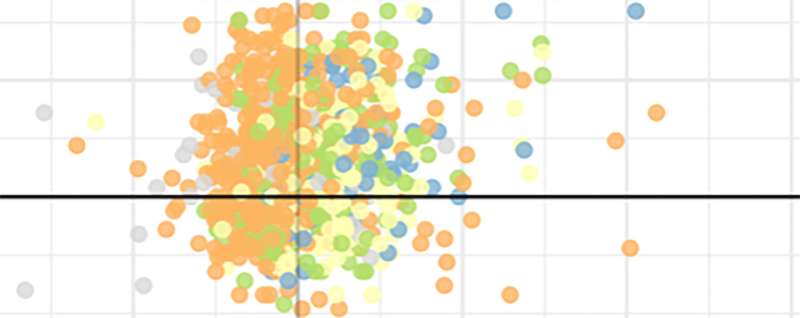Young adult cancer patients may need different treatment options

Not all tumors are alike. Young adults who are diagnosed with skin, colon, and other cancer types may require different treatments than older patients receive. That is the primary conclusion of a Mount Sinai study which systematically compared the genomes of 14 different types of cancers that affected both younger and older adults. The results published in Cell Reports suggest that several genetic hallmarks may play key roles in identifying precise treatment options for young adult cancer patients.
The study was led by William Lee, Ph.D., a former master's degree student in the laboratory of Kuan-lin Huang, Ph.D., Assistant Professor of Genetics and Genomic Sciences at the Icahn School of Medicine at Mount Sinai.
According to at least two recent studies, cancer diagnosis rates in young adults may be rising. However, as the authors of this study note, most of what is known about treating various cancers is based on studies of older patients, creating an apparent knowledge gap that needs to be filled.
To address this, the researchers compared the genomic data of 14 different types of tumors from 1,757 adult patients who were under 50 years of age with that of 3,608 who were older than 50. The data was from The Cancer Genome Atlas, a project funded by the National Cancer Institute. For each tumor, the researchers systematically compared genetic mutations, chromosomal alterations, tumor immune system factors, and the potential to be treated with a known anti-cancer therapy. They then validated the results using additional samples from the International Cancer Genome Consortium.
Overall, the results showed that each type of young adult tumor could be distinguished from older versions by a specific set of hallmarks. For example, the relative proportions of well-known mutations seen in low-grade gliomas, a type of brain tumor, shifted greatly with the patient's age. Endometrial tumors from young adults, by contrast, tended to have more mutations than those from older patients.
Nevertheless, there were some common trends across cancer types. Most notably, the results suggested that the young adults' immune systems responded differently to most of the tumors. This included responses by macrophage and dendritic cells, which are often exploited by anti-cancer immunotherapies.
Finally, the researchers found several differences between how young and older adult tumors may respond to different treatment options, such as to drugs designed against cancer-causing mutations in the BRAF gene. Here the results suggested that anti-BRAF drugs may provide effective treatment options for a higher fraction of young adult skin cancer patients than older ones who have the same tumors. In contrast, older colon cancer patients may benefit more from anti-BRAF treatment options than younger ones. The authors have made these results accessible to other cancer researchers. They also plan to work with others on testing out new ideas for how to combat tumors in young adults.
More information: Kuan-lin Huang, Genomic and Molecular Features Distinguish Young Adult Cancer from Later-Onset Cancer, Cell Reports (2021). DOI: 10.1016/j.celrep.2021.110005. www.cell.com/cell-reports/full … 2211-1247(21)01483-2

















